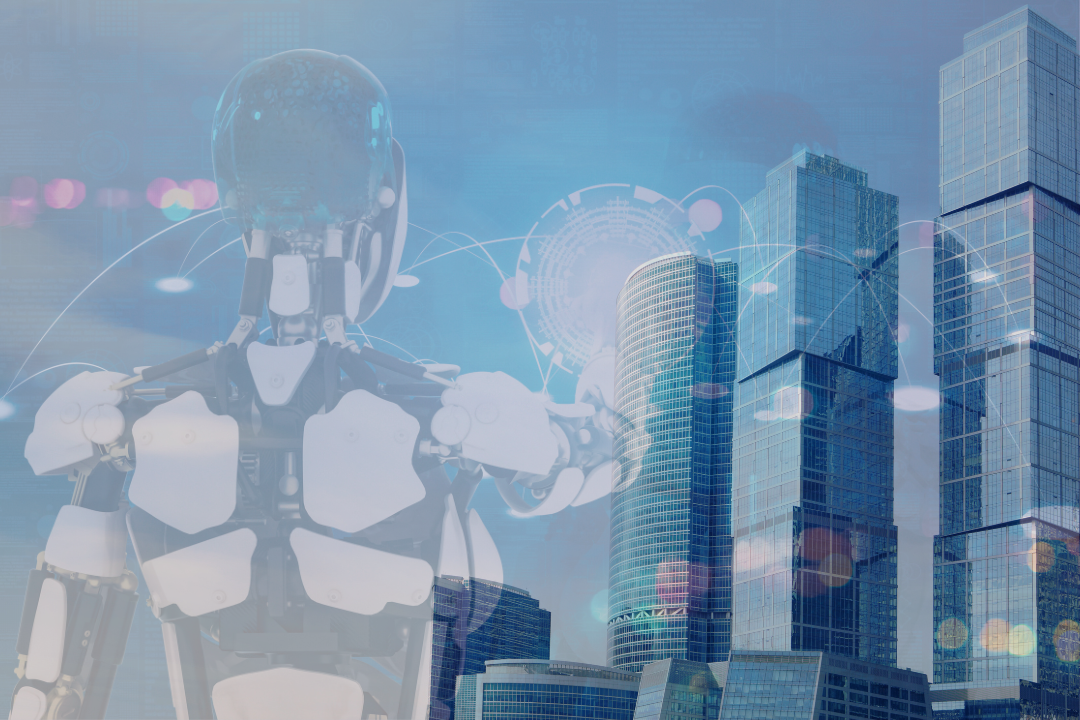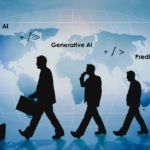What Makes Agentic AI ‘Agentic’? 5 Core Values of Agentic AI to Enterprise
In recent years, AI has become a commonly use technology in enterprise, it’s no longer about why AI replace jobs, but is about how AI enhances daily workflows and bring measurable benefits across business operations. The rapid pace of AI advancements has introduced various types, including AI (called Traditional AI or Predictive AI nowadays), Generative AI, and now, Agentic AI.
The Evolution of AI
The fast evolution of AI reflects the need for continuous improvement. After years of implementation on AI, the very first introduced AI has now become the Traditional AI, has been called narrow or weak AI, it does its pre-set works intelligently, it responds to specific inputs and can learn from data to make predictions, but it operates within strict boundaries. The limitations of traditional AI have become evident in critical areas, such as fraud detection. A survey by the Association of Certified Fraud Examiners (ACFE), based on over 2,000 real cases across various industries and countries, revealed that occupational fraud causes annual losses of over USD 4.7 trillion globally. The typical case remains undetected for 12 months, underscoring the necessity for more sophisticated AI solutions. Although AI-powered fraud detection has been widely adopted and even mandated in some regions, traditional AI’s shortcomings in flexibility and adaptability have accelerated the drive for AI advancements.
Then Generative AI, stepped in. It’s a form of AI that can creates something new from the piece of information we gave it, which some of us are using in daily works to increase efficiency and come out with ideas. Generative AI models are trained on a set of data and learn the underlying patterns to generate new data that mirrors the training set. It creates new content from input data, from text to images, music, and even code. Although GenAI’s publicity and venture capital influx, a recent survey by YouGov conducted for the Reuters Institute for the Study of Journalism found out that 44% percent of the respondents have never used ChatGPT even once, while only 9% of them claimed to use it daily. Not only that, GenAI has limitations: results can be inaccurate, and it’s prone to generating misinformation or biased content. Generative AI models don’t truly “understand” content; they simply mimic patterns from their training data.
Both of these AIs do have its pros and cons when applying in enterprise settings, but why Agentic AI still come into place?
“Gartner predicts that by 2028, at least 15% of day-to-day work decisions will be made autonomously through agentic AI, up from 0% in 2024”
Source from: Gartner Identifies the Top 10 Strategic Technology Trends for 2025
What is Agentic AI?
Agentic AI, or AI agents, represent a transformative step in artificial intelligence (AI). Unlike traditional AI systems that respond only to preset commands or patterns, agentic AI operates fully autonomously. It can make decisions, adapt to its environment, and work toward specific goals. This autonomy makes it highly valuable for complex enterprise tasks.
Imagine an AI system that doesn’t just give answers but actively performs tasks, automates workflows, adjusts in real-time, and plans the next steps. Agentic AI behaves as a true “agent” that reasons, takes action, and learns over time, making it ideal for industries requiring quick, adaptable decision-making, such as finance, healthcare, and customer service.
What makes Agentic AI Truly “Agentic”?
Agentic AI is built on four essential components that make it distinct from traditional AI. These 4 components ladder up to full agentic capability, allow AI agents to operate independently, follow goals, and adjust to different contexts. Here’s what makes agentic AI truly agentic:
- Reasoning: Agentic AI can analyse data, detect patterns, and make logical decisions based on its “understanding” of the task. This reasoning ability allows it to interpret information and act appropriately.
- External Memory: Unlike standard AI, agentic AI accesses and stores relevant information that can be used later. This memory feature enables it to retain context across different tasks, much like how humans rely on past experiences.
- Execution: Agentic AI goes beyond simply responding; it actively uses tools and performs tasks. This means it can carry out complex actions, such as navigating databases or coordinating between departments, making it suitable for workflow automation.
- Planning: Agentic AI doesn’t just react; it strategises. It can break down tasks into steps, monitor its own progress, and adjust plans as needed.
Source from: AI Agents: A New Architecture for Enterprise Automation
5 Core Values of Agentic AI to Enterprises
Enhanced Efficiency and Productivity
Agentic AI significantly enhances productivity by automating routine, time-intensive tasks, freeing up employees to focus on complex, high-value activities. In fields like banking, for example, agentic AI can autonomously handle compliance checks, manage credit assessments, and oversee other data-intensive processes—tasks that traditionally require significant manual effort and time.
Improved Decision-Making with Real-Time Insights
Agentic AI provides significant advantages in data-driven decision-making by processing and analysing data in real time, delivering actionable insights that enhance strategic decision-making. In sectors like healthcare, where timing is critical, agentic AI can support patient care by analysing vital signs, readiness, and healthcare data to assist with discharge planning or immediate follow-up actions.
Beyond healthcare’s agentic AI real-time analytical capabilities are crucial in industries such as finance and retail, where rapid data analysis translates to better risk management and personalised customer experiences. The ability to analyse daily, make informed decisions, and execute actions in real time is transforming enterprise operations, making businesses more responsive to market shifts and customer needs.
Scalability and Flexibility
Unlike traditional AI systems, agentic AI can be easily scaled to handle more complex tasks as business needs grow. Its adaptability makes it ideal for industries that experience seasonal fluctuations or variable demand. In logistics, for example, agentic AI can autonomously adjust delivery routes, optimise inventory management, and handle scheduling as demands change, ensuring that services scale smoothly. This capability allows enterprises to handle increased loads without overburdening human resources.
Cost Reduction and True Usage-Based Pricing
One of the most immediate advantages of Agentic AI for enterprises is the significant reduction in operational costs. By automating complex workflows, Agentic AI minimises the need for human intervention in repetitive or routine tasks. According to TechSee, Agentic AI’s autonomous handling of workflows means that fewer resources are tied up in routine, low-value queries, freeing employees to focus on strategic, high-impact work.
By autonomously managing customer interactions, companies can maintain leaner support teams, reducing costs associated with salaries, benefits, and training. With 24/7 availability, agentic AI also reduces expenses tied to night shifts, weekend staffing, and holiday coverage. These attributes not only make AI more accessible to budget-conscious businesses but also enable true usage-based pricing, where companies pay based on results achieved, such as the number of tasks completed or issues resolved. A report from Autonomous suggests that by 2030, traditional financial institutions can save up to $31 billion of their underwriting and collection system costs with AI technologies.
Customised Cognitive Architectures for Specialised Tasks
Agentic AI’s ability to be tailored for specific business processes and regulatory requirements makes it particularly valuable in highly regulated industries like finance, healthcare, and education. Unlike general-purpose models, these tailored cognitive architectures let AI agents perform specialised tasks in structured, step-by-step workflows. This approach allows AI to function more like a human assistant, enhancing both accuracy and regulatory compliance, which is crucial for sectors that require adherence to strict standards.
For example, in software engineering, custom AI agents can assess dependencies, suggest code changes, execute tests, and manage deployments with precision. As Sequoia Capital notes, “domain and application-specific reasoning” is essential for practical utility, as general models struggle to meet the specific demands of different industries. As agentic AI advances, these tailored architectures will empower businesses to automate complex tasks with greater confidence and efficiency, knowing their AI is optimised for their exact operational needs.
A Revolutionary Way of Works for Organisations with Agentic AI
Agentic AI represents a new frontier in enterprise automation, with the potential to transform the way businesses operate. By combining reasoning, memory, execution, and planning, agentic AI provides a level of autonomy that traditional AI lacks. As enterprises seek greater efficiency, cost savings, and more responsive decision-making, agentic AI emerges as a strategic solution for staying competitive.
The ability to customise agentic AI for specialised tasks, along with scalable, outcome-driven benefits, makes it an essential tool for enterprises ready to embrace the future of automation. As agentic AI technology continues to evolve, its potential for transformative, real-world applications across diverse industries will only grow, solidifying its place in the business landscape.












